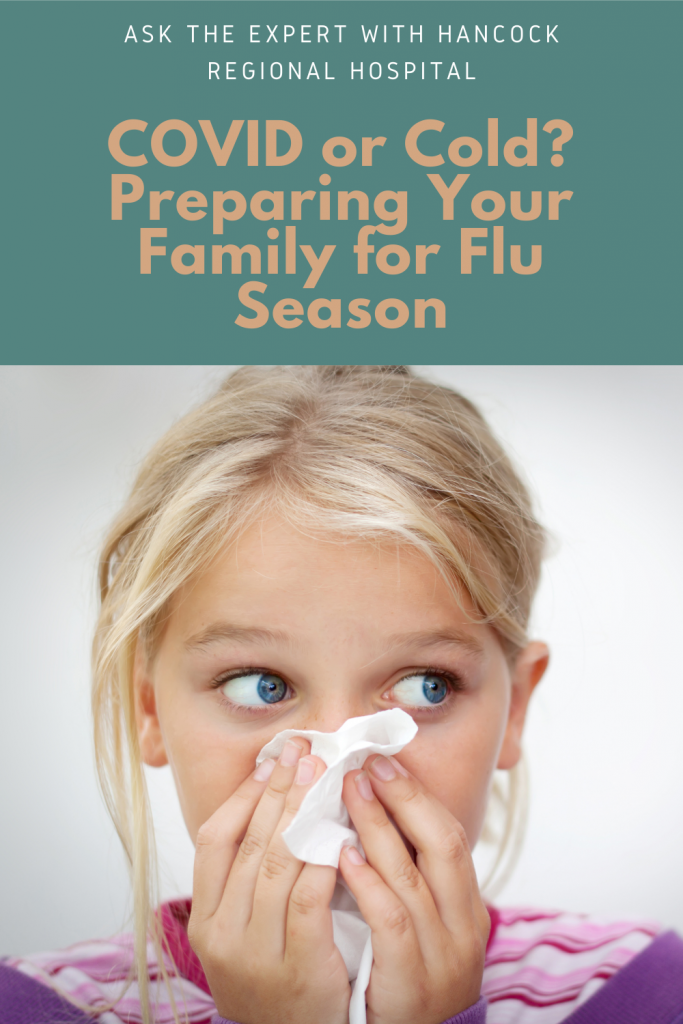 There is no doubt this year has been stressful. The constant cycle of COVID anxiety seems never-ending, and now we are about to enter the cold and flu season. If you find yourself playing the “is it a cold, flu, or COVID?” game with your children, Indianapolis Moms and Hancock Regional Hospital has your back. Dr. Paul Halter is with Hancock Pediatrics in part of Hancock Regional Hospital, and we recently spoke with him via Facebook Live about the upcoming cold and flu season and how to handle these illnesses while we are still in the midst of the Coronavirus pandemic.
There is no doubt this year has been stressful. The constant cycle of COVID anxiety seems never-ending, and now we are about to enter the cold and flu season. If you find yourself playing the “is it a cold, flu, or COVID?” game with your children, Indianapolis Moms and Hancock Regional Hospital has your back. Dr. Paul Halter is with Hancock Pediatrics in part of Hancock Regional Hospital, and we recently spoke with him via Facebook Live about the upcoming cold and flu season and how to handle these illnesses while we are still in the midst of the Coronavirus pandemic.
Cold and flu season is coming and with the added stress of COVID, what are a few things parents can do to keep their family healthy this year?
The best way to prevent other illnesses, whether that be a cold or the flu, is to continue to use good hygienic measures that we have been practicing in 2020. Wash your hands, use hand sanitizer, practice social distancing while wearing a mask, and avoid public places as much as possible.
According to Dr. Halter, during last year’s flu season, doctors started to see flu cases from the Christmas season right up until March. Once COVID hit and schools were shut down, they stopped seeing influenza, so people need to keep using good hygiene skills to stop not only the spread of COVID but to help prevent the cold and flu as well.
Let’s talk cold and flu versus COVID. What are symptoms parents can look for when trying to determine if a COVID test is necessary or if it’s just a basic cold?
The medical field is challenged with this right now, says Dr. Halter. They are trying to differentiate the cold versus the flu versus COVID because the symptoms mimic each other. You can even include allergies into the mix right now. There are a few symptoms that are specific to COVID – the loss of taste and smell. For a young child that can be difficult to describe, but for an older child or adolescent, that alone is enough reason to consider the diagnosis of COVID. The other symptoms – body aches, fever, congestion, cough, runny nose, sore throat – can be seen with a cold, flu, and COVID. Allergies stand out uniquely because they are often distinguished with a lack of fever and include itchiness of the nose or eyes.
The message Dr. Halter would send to parents is it’s reasonable to watch a child as those symptoms develop. Most cold symptoms resolve within a matter of a few days, and flu symptoms resolve within five to seven days. COVID symptoms can last a week or two. It would be appropriate for a parent to watch the evolution of those symptoms for the first few days and if the symptoms are persisting, it is important to test for COVID.
Speaking of testing, it’s essential for parents to not fear the testing. We have really seen a change in the technology for testing that allows just a simple nasal swab. They are less invasive and more comfortable. Dr. Halter says those simple tests are as accurate as the initial deep swab that was used five or six months ago. If there is any question, make an appointment to get your child tested.
Also important – keep the kids home if there are symptoms and make sure the symptoms are resolving. And if you do get your child tested, make sure there’s a negative test result before going back to your regular routine.
When planning your flu vaccine, is there a specific time frame you recommend? Is sooner better or can the effectiveness of the shot wear off if you get it earlier in the season?
Dr. Halter says it’s important to get the flu vaccine this year, now more than ever. There is a double-edged sword with the timeframe of the flu vaccine. On the one hand, there is reason to believe the flu vaccine wears off. It depends on the patient and their immune response. On the other hand, if you wait too long to get the vaccine, the supply of the vaccine may run low or run out. Sometimes pediatrician offices can run out of the vaccine.
It can typically take four to nine months for the effect of the vaccine to wear off. Peak flu season is usually from December through February. Dr. Halter’s advice would be to get it done when you first get the chance in case you aren’t able to get back into your pediatrician’s office. The sooner the better; seize the opportunity to get it.
Many times you hear parents concerned about the flu vaccine making their kids sicker, but can it really “give you” the flu?
The flu vaccine does not cause influenza. It is made in such a way that there is no full virus that is actually in the shot, only parts of the virus. Dr. Halter gave a good example to help explain how the flu shot is distributed to your immune system. If he wanted to immunize you to a zebra, he wouldn’t put a whole zebra in the vaccine. He would only put a small part of the animal (such as a hair of the tail) into the shot. Then, when your immune system would see hair from the zebra, it would know to respond to that. So when it comes to the flu vaccine, there are only parts of influenza in the shot, not enough to give you the flu.
Does the flu vaccine work? Share with us some statistics about the flu vaccine!
Dr. Halter says the one thing the medical field does know is that the flu vaccine isn’t always entirely effective. The best they have been able to do in the last decade is 60% effectiveness. Each year the flu vaccine components change based on our understanding of the circulation of influenza in other parts of the world. The medical field looks at other countries on the opposite hemisphere and predicts what we might see during our flu season. They take those components and put them in a vaccine, which is not 100% effective.
However, while it’s not perfectly effective, getting the flu vaccine will protect you from becoming seriously ill. Dr. Halter emphasized that the vaccine without a doubt prevents children and adults from ending up in the hospital from severe flu complications. It can also shorten the course of the illness. Instead of being sick for weeks, the vaccine can cut it down to days. Dr. Halter is still a strong advocate of getting the flu vaccine.
Watch our interview with Dr. Halter here:
About Dr. Paul Halter, MD
Dr. Paul Halter, also known as PJ, is a board-certified pediatrician with Hancock Pediatrics in the Hancock Regional Hospital. He enjoys educating and guiding parents through raising children and keeping them on the right path. He completed his undergraduate degree in Electrical Engineering from Purdue University and earned his master’s degree in science from Indiana University. He earned his medical degree from Indiana University School of Medicine in 2001.
 Hancock Health is an Indiana-based, full-service healthcare network serving Hancock County and the surrounding areas. Our health system includes Hancock Regional Hospital, Hancock Physician Network, and more than 20 other healthcare facilities, such as wellness centers, women’s clinics, family practices, and the Sue Ann Wortman Cancer Center. Learn more at https://www.hancockregionalhospital.org.
Hancock Health is an Indiana-based, full-service healthcare network serving Hancock County and the surrounding areas. Our health system includes Hancock Regional Hospital, Hancock Physician Network, and more than 20 other healthcare facilities, such as wellness centers, women’s clinics, family practices, and the Sue Ann Wortman Cancer Center. Learn more at https://www.hancockregionalhospital.org.










